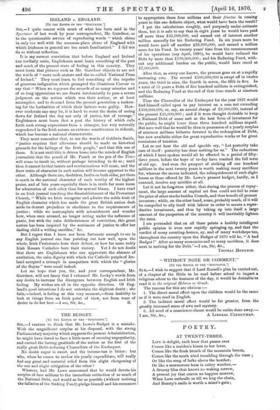THE BUDGET.
[To THE EDITOR OF THE "SPECTATOR."] SIR,—I venture to think that Mr. Lowe's Budget is a mistake. With the magnificent surplus at his disposal, with the strong Parliamentary majority which supports the present Administration, he might have dared to face a little more of seeming unpopularity, and earned the lasting gratitude of the nation as the first of the really great Debt-reducing Chancellors of the Exchequer.
No doubt sugar is sweet, and the income-tax is bitter ; but who, when he comes to review his yearly expenditure, will really feel any great and material relief from this slight cheapening of the one and slight mitigation of the other ?
Whereas, had Mr. Lowe announced that he would devote his surplus of four millions to the immediate extinction of so much of the National Debt, and would as far as possible (without reviving the fallacies of the Sinking Fund) pledge himself and his successors to appropriate these four millions and their fructus in coming years to this one definite object, what would have been the result?
I put the calculations roughly, and purposely under-estimate them, but it is safe to say that in eight years he would have paid off more than £33,000,000, and earned out of interest another million annually for his Reducing Fund. In six years more he would have paid off another £33,000,000, and earned a million more for his Fund. In twenty years' time from the commencement of his operations (say April, 1890), he would have reduced the Debt by more than £100,000,000; and his Reducing Fund, with- out any additional burden on the public, would have stood at £7,000,000.
After that, as every one knows, the process goes on at a rapidly increasing rate. The second £100,000,000 is swept off in twelve years, the third in nine, the fourth in seven, the fifth in five. In a total of 53 years a Debt of five hundred millions is extinguished, and the Reducing Fund at the end of that time stands at nineteen millions.
Thus the Chancellor of the Exchequer for the year 1923 would find himself called upon to pay interest on a sum not exceeding £300,000,000, or, say, an annual charge of £9,000,000, instead of the present £.25,000,000 ; and if it were thought desirable to keep a National Debt of some sort as the best form of investment for the public, he might leave these three hundred millions unpaid. But note well that he would be then in possession of a yearly surplus of nineteen millions hitherto devoted to the redemption of Debt, but now available either for great reproductive works or for great remissions of taxation.
Let us not hear the old and ignoble cry, " Let posterity take care of itself : posterity has done nothing for us." The reductions of which I have spoken would all be effected in a period of fifty- three years, before the boys of to-day have reached the full tern) of old age. And even the prospect of striking off one hundred millions in the next twenty years is worth making many sacrifices for, whereas the means indicated, the relinquishment of such slight boons as those offered by Mr. Lowe's present budget, hardly, as I contend, involve any sacrifice at all.
Let it not be forgotten either, that during the process of repay- ment, the large amount of capital set free could not fail to raise the price of other stocks besides Consols, and thus benefit all present investors ; while, on the other hand, some, probably mach, of it will be compelled to ally itself with labour in order to secure a repro- ductive investment, and thus by taking up into itself a large amount of the pauperism of the country it will inevitably lighten the rates.
I am persuaded that on all these points a healthy intelligent public opinion is even now rapidly springing up, and that the verdict of many counting-houses, ay, and of many workshops too, throughout the country upon the Budget of 1870 will be, "A bad Budget I" After so many economies and so many sacrifices, it does. next to nothing for the Debt."—I am, 'Sir, &c.,
THOMAS HODGKIN.






























 Previous page
Previous page